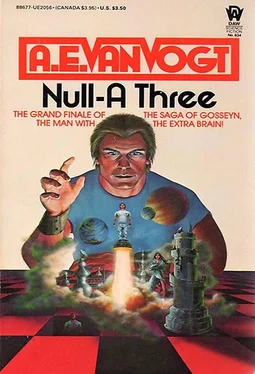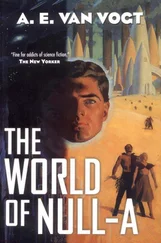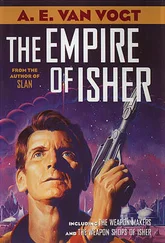Alfred Van Vogt - Null–A Three
Здесь есть возможность читать онлайн «Alfred Van Vogt - Null–A Three» весь текст электронной книги совершенно бесплатно (целиком полную версию без сокращений). В некоторых случаях можно слушать аудио, скачать через торрент в формате fb2 и присутствует краткое содержание. Жанр: Фантастика и фэнтези, на английском языке. Описание произведения, (предисловие) а так же отзывы посетителей доступны на портале библиотеки ЛибКат.
- Название:Null–A Three
- Автор:
- Жанр:
- Год:неизвестен
- ISBN:нет данных
- Рейтинг книги:3 / 5. Голосов: 1
-
Избранное:Добавить в избранное
- Отзывы:
-
Ваша оценка:
- 60
- 1
- 2
- 3
- 4
- 5
Null–A Three: краткое содержание, описание и аннотация
Предлагаем к чтению аннотацию, описание, краткое содержание или предисловие (зависит от того, что написал сам автор книги «Null–A Three»). Если вы не нашли необходимую информацию о книге — напишите в комментариях, мы постараемся отыскать её.
Null-A 3 is destined to become an instant classic — a mind boggling galaxy-spanning adventure!
Null–A Three — читать онлайн бесплатно полную книгу (весь текст) целиком
Ниже представлен текст книги, разбитый по страницам. Система сохранения места последней прочитанной страницы, позволяет с удобством читать онлайн бесплатно книгу «Null–A Three», без необходимости каждый раз заново искать на чём Вы остановились. Поставьте закладку, и сможете в любой момент перейти на страницу, на которой закончили чтение.
Интервал:
Закладка:
Palomar!
His first impression: an indoor garden. Small trees. Shrubs. Some equivalent of grass. Presumably—that was the immediate thought—a large greenhouse aboard this huge vessel.
He had other fleeting awarenesses—of distinctly higher ceilings, of half-hidden doorways, dozens of them, partly visible through the shrubbery. The doors were at the far end of the garden. In between, mostly to his left—he had glimpses only—was the glint of water.
A pool? He couldn’t be sure. Because, at virtually the exact moment that he and his guide stepped across the threshold of the double door Breemeg had opened, and stepped onto the garden walk, the man said:
“Well, Mr. Gosseyn, now you know the problem of the adults aboard this command vessel of the Dzan fleet. We have to spend our waking hours in sickening, miserable, outrageous subservience to a mad boy who has a special brain control of live energy.”
Unexpected remark, yes. But at some level, not totally. The earlier Gosseyns had met and observed toadies. So, now, silently, as he heard those bitter words, Gosseyn shook his head unhappily. His thought:… I’m about to hear an attempt to involve me in the secret politics of a resistance group—And of course the answer to that from a General Semanticist had to be—what? Obviously, something related to survival.
He thought:… I’m on this ship, still—I decided to stay—not because I intended to take sides, or make special friends, but to find out what happened to cause these people to arrive in the vicinity of the space capsule where I was waiting in a very special state of suspended animation—
That had to continue to be more important to him than any problem that the Dzan lesser nobility had with their monarchy. Except—
Well to remember that the captured inhabitant of the capsule—Gilbert Gosseyn—had now been given secret information: someone or group hated the imperial power so viciously that, presumably, they were revealing that hatred with the intention of using the new arrival against the young emperor.
And, if it turned out that he did not consciously intend to involve himself, then what would the plotters do?
Would they feel that they had to silence him?
That was likely, but least likely. Because, if they were capable of murder, then it would be simpler to murder the boy and throw the blame or this strange, mysterious individual who had been brought aboard against the advice of, uh, the plotters. That could be the ploy.
Gosseyn realized that he was smiling grimly. The fact was, he thought, it would take a while for this situation to develop. And so his preliminary response had to be… questions.
The first question he asked seemed to be far from his basic purpose in the interrogation sequence. But it had its own significance. He asked: “The young emperor’s father—what happened to him?”
They were almost at one of the doors by the time Gosseyn spoke that warding-off sentence. The words seemed to have an impact, because Breemeg stopped. Simultaneously, he reached over and placed a restraining hand on Gosseyn’s arm.
Gosseyn accepted the touch as a signal to halt. And so, he stopped also. Slowly, then, he turned to face the other man. And added to what he had already said, “I presume the boy inherited his position from a deceased parent.”
He was looking at Breemeg’s face as he spoke. And so he saw the thin lips tighten, and become thinner, if that were possible. And then that lip action reversed. The face twisted into a snarl, with the lips drawn back, as Breemeg said harshly, “That S.O.B.!”
It was a reply that left no doubt: The unexpected revelation of this man’s feelings would have to be dealt with—from now on.
Gosseyn stood silent, and waited for clarifying words that might explain the strong feelings against the missing father of the emperor. Without such additional information, it was not easy to bridge the gap between this hate-filled individual and the suave, alert courtier who had had the good sense to urge that Gosseyn let the emperor win the breathholding contest.
And, of course, it would be equally difficult to determine what approach, deriving from General Semantics, could be used to deal with the problem. Solutions required the person doing the solving should understand the situation.
The moments went by; and Breemeg stood there, staring. And so it seemed to Gosseyn that it was time for a practical purpose, having nothing to do with the emotional reality that held the other man rigid.
What he said had its own simpler reality: “How long have I got before I’m due at The Place?”
“Uhhh!” said Breemeg.
If it were possible, the man’s face actually seemed to turn whiter. It was as if he was coming up out of some enormous inner depth, and back to the world around him. Abruptly, his fingers on Gosseyn’s wrist tightened. And tugged.
The direction of the tug was toward the door in front of them. And, suddenly—just like that—the suaveness was back.
It was the courtier who said quietly, “We’d better get you inside, and provide you with food. His majesty doesn’t like to be kept waiting—as you should know.”
It was purpose again, which would lead to more information. Moments later, the door was opened by Breemeg’s free arm and hand reaching toward some equivalent of a latch, or automatic lock.
The door swung inward. As it did so, Gosseyn had a quick view of a carpeted floor, a green colored settee and large green chair, with some tables off to one side. And then, from that area—where the tables were—the voice of Voice Two said: “Come in, come in, Mr. Gosseyn, we’ve got everything ready for you.”
In a way it was a surprise to hear that familiar voice, though not a disturbing surprise. But, as Gosseyn walked across the threshold and so into the outer room, he had already savored Voice Two’s use of the word, “we.” Thus, as, first, he saw Voice Two, and then through a doorway that led to another, smaller room, Voice One, he deduced that he was to be kept in contact with a small number of individuals, particularly persons who were already acquainted with his background.
So he said, “Hello!” to Two, and waved vaguely at One. Throughout the tiny interchange, he was aware of Breemeg behind him. And so, it was not an unexpected comment when the courtier said in the tone of a superior talking to a subordinate:
“Mr. Onda, what have you prepared for our guest?”… So he was about to learn names. Or—as it turned out—only one name. But even that was welcome.
Voice Two—Onda—said in a tone that accepted the subservient role, “Sir, we have chemically tested the fluids that were used in the capsule to feed our, uh, guest. And we have prepared a soup mixture combining some of the food elements we found.”
He was the larger of the two men—except for his head, which was long, whereas Voice One had a square-built face. Onda was the older of the two men. He spoke now almost apologetically, “It will require a few hours to prepare a more substantial meal.”
Breemeg acknowledged the explanation with a curt nod that somehow conveyed imperious acceptance. Whereupon, he took Gosseyn by the arm. “Let me show you your quarters,” he said.
It was the first actual verbal confirmation that he had, indeed, arrived at the first of his destinations. And that here, presumably, he would be staying while he was aboard ship. Gosseyn decided not to consider at the moment how long he would stay aboard. That decision should be discussed with his faraway alter ego.
What followed was a quick tour to, first, a bedroom, with an adjoining bath, then to a small, combination study and dining room—at least that was his silent description of the place: what made it a study was that something resembling a TV screen and other electronic equipment was either on one wall, or extended from it; and there was a chair and a desk; and at one end a glossy table that could have been a dining table. A number of chairs were spaced at intervals.
Читать дальшеИнтервал:
Закладка:
Похожие книги на «Null–A Three»
Представляем Вашему вниманию похожие книги на «Null–A Three» списком для выбора. Мы отобрали схожую по названию и смыслу литературу в надежде предоставить читателям больше вариантов отыскать новые, интересные, ещё непрочитанные произведения.
Обсуждение, отзывы о книге «Null–A Three» и просто собственные мнения читателей. Оставьте ваши комментарии, напишите, что Вы думаете о произведении, его смысле или главных героях. Укажите что конкретно понравилось, а что нет, и почему Вы так считаете.











